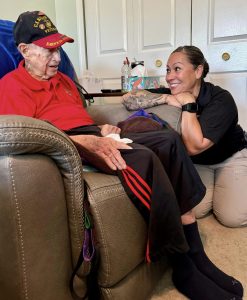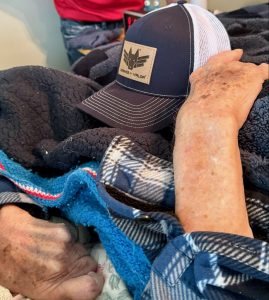We Were Just Marines, Visiting a Fellow Marine
By Chris Bowers
Editor’s note: This blog was updated on Oct. 16, 2024.
The call came from our friend, Margarida, a Spotsylvania Sheriff’s deputy and former Marine. Our county’s oldest living veteran, 104-year-old Fred Moufang, had begun hospice care and wanted nothing more than to spend time with other Marines.
Margarida met Fred two years ago when he was honored during the sheriff’s annual Veterans Day celebration. They have been friends ever since.
Though Fred had never been one to share details of his time in the Pacific theater during World War II, he was immensely proud of being a Marine. I can understand the unspoken kinship he felt with others who’ve served, despite the generations that separated us.
When Margarida asked if we’d like to visit Fred with her, I didn’t hesitate. What an honor.
I brought along Maverick, a 19-month-old golden retriever who will soon graduate as a service dog for another Marine, this one who served in Iraq and Afghanistan.
Margarida led us to Fred’s second-floor bedroom in the house he shared with his daughter and son-in-law. A front-page newspaper article featuring Fred at age 102—even then the oldest living veteran in Spotsylvania—hung on the wall next to the door.

Spotsylvania Sheriff’s Deputy Margarida Figueroa is friends with Fred Moufang, a 104-year-old veteran of World War II.
Fred was 21 on Dec. 7, 1941, when the Japanese attack on Pearl Harbor plunged America into war. He enlisted in the U.S. Marines in 1943 and was soon headed to the Pacific Theater, fighting in the battles of Saipan and Okinawa. After the war, he began a career in banking and married his wife, Helen, with whom he had two children. They settled in Union, N.J., where they lived for more than 50 years. In 1993, the couple relocated to Fredericksburg and spent their later years as active and devoted grandparents.
After such a long and fulfilling life, Fred was slipping away. I could see that, like the Pyramids of Egypt, time had taken its toll on this old Marine, withering away the rough exterior to expose a gentler side of the man. His eyes took in each of us, including Maverick, as if he was searching his vast memory to remember us rather than wondering who we were.
We were just Marines, visiting a fellow Marine.
Margarida introduced us, and I told him how Maverick would soon be helping another Marine. I pointed to the logo on my hat—Leashes of Valor—and told him how we raised dogs to help veterans.

Fred Moufang at his home in Spotsylvania County with his new hat.
Margarida pointed out my prosthetic leg to him. The terrorist attacks of Sept. 11, 2001, had been my generation’s watershed moment; I enlisted in the Marines with several friends after high school graduation. During a deployment to Iraq, I experienced a catastrophic injury that cost me my leg. I can’t be certain what I saw in Fred’s eyes when he noticed my missing leg, but I think it was interest, and perhaps a kind of knowing. This was a Marine who’d served during the Battle of Okinawa, a three-month fight that cost America the lives of 12,000 of its young men.
We gave him a hat like the one I wore. A nurse placed it on his head, and after she’d taken it off and set it on a chair next to him, he asked for it again. Margarida held his hand.
We owe everything to Fred and to those like him. The Greatest Generation stood tall before the rise of tyranny and oppression. They protected our parents’ generation so they could provide us with the life we lead now. They saved the world, really.
In our final minutes together, I felt the time and space between Fred’s war and mine fall away. We were two Marines sitting next to each other who needed no words.
Epilogue
I would visit the old Marine one more time.
On Oct. 5, 2024, Fred died peacefully at home surrounded by family and friends.
Though we should all be so lucky, I can’t help but feel that something sacred has passed from us. Here was a man who survived the Great Depression, a world war, cancer. Here was a man of “inimitable enthusiasm,” whose interests were as varied as golf and art. “He was disarmingly charming and charismatic,” his family says of him in his obituary. “He was known to be a great dancer, gave the best toasts, told the funniest jokes, and was the glue that held his family and friends together.”
No wonder he was surrounded by them as he drew his last breath. No wonder the world feels emptier without him.
Fred’s death is also a reminder of the sharply declining number of living World War II veterans. Of the 16 million Americans who served, only about 119,000 remain—less than one percent. The Department of Veteran Affairs estimates that just 12 years from now, only a few hundred will still be alive.
Yet when the last of them passes from us, we will still stand in the shadow of their greatness.
I can only hope we made them proud.
Chris Bowers is a retired Marine and director of development for Leashes of Valor.
